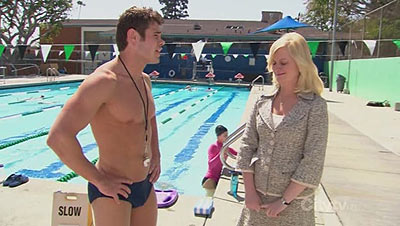Don’t Fall Into The Pit: Parks And Recreation
Published on July 30th, 2009 in: Comedy, Current Faves, Issues, Reviews, TV |By Lisa Anderson
A network TV season has ended, and as usual, the battlefield is littered. Some shows have been renewed, some have been axed, and some have found homes on other networks. One survivor among new shows was Parks and Recreation, a sitcom co-produced by and starring Saturday Night Live alum Amy Poehler.

Screencap by funsized
I was dubious about this one at first. It was touted as a spin-off of The Office, which I love, so I didn’t think that it could possibly be as good. The fact that it would not be in an office setting only made it seem more risky, but induced me to try it. I watched it all online: there are only six episodes, not counting the producer’s cut of the finale. I wasn’t really hooked at the time, but something kept me coming back. The final episode, however, raised the stakes and caused all the pieces to fall into place.
Poehler portrays Leslie Knope, assistant director of the Department of Parks and Recreation in Pawnee, Indiana. Her journey, as we see it, begins at a town hall meeting, where local nurse Ann Perkins (Office alum Rashida Jones) complains about the huge pit in an abandoned development next to her house. Ann’s musician boyfriend, Andy, fell into “the Pit” late one night and broke both legs. Knope impulsively promises not only get the pit filled in, but to turn it into a beautiful new park.
Knope is a clueless character very much in the mold of The Office‘s Michael Scott. As a result, Parks and Recreation, much like The Office, can make for painful watching. On the one hand, she manages to take her job far too seriously, touting Pawnee as every bit a jungle as Washington, D.C. On the other, she is oblivious to the actual subtleties and snares around her. She is impossible to dislike, however, because she so sincerely believes in her job and wants to help people. She is also very conscious of her role as a female in government. and has a great respect for other women in public service, regardless of party.
Park of what drew me into this story was how timely it was. The very presence of The Pit speaks to the recent housing and economic crises. The Pawnee government, like state and local governments all over the US, exists in this strange limbo where bailout money is coming in but there is political pressure not to use it. One thing I liked in the first episode was the character of Ron Swanson, who illustrates the absurdity of an anti-government person working for the government. “I’d rather work for Showbiz Pizza,” he says after lauding the private sector and praising that company’s “impeccable business model.” It begs the question: why doesn’t he, then?
Clearly, Leslie is not the only character with blind spots, any more than Michael Scott is in his world at Dunder Mifflin. In addition to Swanson, there is the unctuous but politically savvy Tom Haverford, Lebanese-American and self-proclaimed redneck. There is also Mark Brendanawicz, full-time city planner and part-time Lothario. He has lost both his optimism and naiveté about government work, but nevertheless finds himself on Leslie’s new subcommittee. (He and Leslie slept together years ago, and she still speaks of it glowingly, while he barely remembers it.) Ann and Andy each exhibit their own kind of cluelessness, mostly with respect to each other. All of these characters, however, are given moments of grace, and those are what make the show watchable. The only one without some kind of merit might be Leslie’s mother Marlene, who has a terrifying reputation, and fails to recognize her daughter’s potential and beautiful spirit.
Pages: 1 2
Time limit is exhausted. Please reload the CAPTCHA.